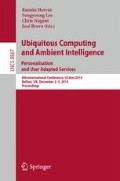Abstract
This paper described how ubiquitous computing and ambient intelligence can be applied in order to make more accessible the public road transport for people with special needs. The main goal of the proposed system is to assist to this kind of people during the trips. This system is autonomous and does not affect the common operations carried out in the public transport infrastructure; it provides useful data obtained transparently, using different sensors installed in the infrastructure.
Access this chapter
Tax calculation will be finalised at checkout
Purchases are for personal use only
Preview
Unable to display preview. Download preview PDF.
References
Geehan, T.: Improving Transportaion Information: Design Guidelines for Making Travel More Accessible (TP 12705E). Transportation Development Centre Transport Canada (1996)
Duvarci, Y., Yigitcanlar, T.: An Integrated Modeling Approach for the Transportation Disadvantaged. Journal of Urban Planning and Development 133(3), 188–200 (2007)
Mitchell, C.G.B., Ling Suen, S.: Urban Travel, Intelligent Transportation Systems, and the Safety of Elderly and Disabled Travelers. Journal of Urban Technology 5(1), 17–43 (1998)
Fink, J., Kobsa, A.: Adaptable and Adaptive Information Provision for All Users, Including Disabled and Elderly People. New Review of Hypermedia and Multimedia 4, 163–188 (1998)
Barbeau, S.J., et al.: The travel assistant device: Utilizing gps-enabled mobile phones to aid transit riders with special needs. In: Proc. 15th World Congress on Intelligent Transportation Systems, New York (2008)
Sánchez, J.H., Oyarzún, C.A.: Mobile audio assistance in bus transportation for the blind. In: Proc. 7th International Conference Series on Disability, Virtual Reality and Associated Technologies with ArtAbilitation, Maia, Portugal (2008)
Zhou, H., Hou, K., Zuo, D., Li, J.: Intelligent Urban Public Transportation for Accessibility Dedicated to People with Disabilities. Sensors 12, 10678–10692 (2012)
Emiliani, P.L., Stephanidis, C.: Universal access to ambient intelligence environments: Opportunities and challenges for people with disabilities. IBM Systems Journal 44(3), 605–619 (2005)
European Committee Standardization: Reference Data Model for Public Transport, Tech. Rep. CEN TC278 (2005), http://www.cenorm.be
Author information
Authors and Affiliations
Editor information
Editors and Affiliations
Rights and permissions
Copyright information
© 2014 Springer International Publishing Switzerland
About this paper
Cite this paper
García, C.R., Quesada-Arencibia, A., Cristóbal, T., Padrón, G., Pérez, R., Alayón, F. (2014). Using Ambient Intelligence to Improve Public Transport Accessibility. In: Hervás, R., Lee, S., Nugent, C., Bravo, J. (eds) Ubiquitous Computing and Ambient Intelligence. Personalisation and User Adapted Services. UCAmI 2014. Lecture Notes in Computer Science, vol 8867. Springer, Cham. https://doi.org/10.1007/978-3-319-13102-3_4
Download citation
DOI: https://doi.org/10.1007/978-3-319-13102-3_4
Publisher Name: Springer, Cham
Print ISBN: 978-3-319-13101-6
Online ISBN: 978-3-319-13102-3
eBook Packages: Computer ScienceComputer Science (R0)

